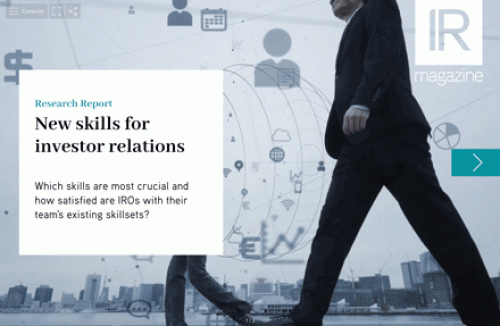Gallup calls them the ‘job-hopping generation’, while Deloitte’s 2020 millennial survey shows that almost a third wanted to change jobs within at least two years.
What this group – which has overtaken baby boomers as the largest generation in the US – wants from a career, according to PwC, is a place where people can learn, grow and develop. And that’s what IR offers to an expanding group of younger investor relations professionals.
IR is very much a community and one that boasts a large group of seasoned IROs who stay for many years in the profession: testament to how rewarding IR can be as a career. IR has evolved a lot in the past few decades – not only in the responsibilities involved but also in the way people get into the profession.
Many say they just ‘fell into’ IR but, today, people are joining the profession via apprenticeships, associations offer exams and certifications and IR-specific modules are available at several universities, while high-level IROs are increasingly mentoring younger people keen to progress in the profession.
Sophie Peeters, who works in IR and treasury at the International Finance Corporation, joined the private sector arm of the World Bank Group (WBG) after completing her MSc in finance in the Netherlands. ‘I was eager to pursue a career at the intersection of finance and sustainable development,’ she says. She saw the WBG, the largest development bank in the world, as ‘the optimal place to kickstart my career: I quite literally booked a one-way ticket to Washington, DC.’
Peeters – who was named as one of SRI’s inaugural 30 under 30 group – cites the bank’s head of IR Esohe Denise Odaro (herself a member of NIRI’s most recent 40 under 40 list) as her mentor.
‘Having a mentor who is inclusive, devotes time and energy and asks critical questions is crucial to the professional development of millennials and Gen Zs,’ Peeters points out. Under Odaro’s wing, Peeters says she has ‘come to learn the ins and outs of the IR profession, sustainable bonds and impact reporting.’
Elsewhere, apprenticeships can offer a route into a career that might otherwise not be on some younger people’s radars. Rebecca White explains how she joined the UK’s IR Society through an apprenticeship program, developing ‘a passion for the industry’ and going on to pass the society’s CIR exam.
Despite not knowing anything about investor relations when she started out, White says she now sees IR as a ‘unique’ profession – and one she very much wants to stay involved in. ‘The investor relations role varies from company to company, covering a wide range of issues: it is very interesting and complex,’ she says.
The value of IR
Much is written about the values of millennials and Gen Zs, from a focus on experiences and inclusivity to an emphasis on ESG and diversity – both in their investments and in their daily lives. Millennials, according to Deloitte, want their values to align with the brands they support. Does this also apply to investor relations?
For Peeters, the answer is: ‘Absolutely! I think people my age tend to question the norm and challenge the status quo in a manner that reflects the experiences of our generation. I think this drives us to increasingly seek accountability and transparency from the companies we invest in, rather than just assuming they act in the [interest of] public good. For me, this has become increasingly apparent during meetings with fixed-income portfolio managers from my generation, where they specifically want to understand the tangible impact achieved and how we screen projects on ESG, in addition to conversations about credit.’
This is an extract of an article that was published in the Summer 2021 issue of IR Magazine. Click here to read the full article.










